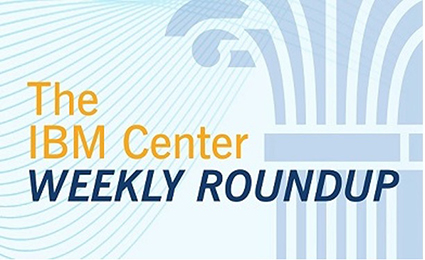
Weekly Roundup October 17-21, 2022

Accelerating Government with ACT-IAC – Episode 20 – FITARA Enhancements. On this episode, Dave Wennergren talks with technology executives Richard Spires, Margie Graves and Dave Powner about the recently released ACT-IAC report: “Recommendations for Evolving the FITARA Scorecard.”
Senate confirmation process lags as leadership vacancies remain. President Joe Biden has yet to name nominees for the Social Security Administration’s top two leadership positions. The Office of Personnel Management hasn’t had a deputy director in nearly two years. And Biden just withdrew his nominee for controller at the Office of Management and Budget. This handful of vacancies points to a much larger problem: the White House is struggling to nominate and get federal leaders confirmed by the Senate. It’s an issue that’s existed for at least the past few administrations, and it’s getting worse.
An influential Congressional staffer is now a NAPA fellow. Among this year’s fellows added to the National Academy of Public Administration are several still-working, senior federal employees. One of them is prominent on Capitol Hill and the Federal Drive with Tom Temin had a chance to conduct this extended 17-minute interview with her. She’s Wendy Ginsberg, staff director for the Subcommittee on Government Operations of the House Committee on Oversight and Reform.
GAO Faults Education Dept. on Student Aid IT Modernization Progress. The Department of Education’s Office of Federal Student Aid (FSA) has made some progress in its Next Gen program since it first launched in 2017, but ongoing scheduling delays pose significant challenges to those modernization efforts, the Government Accountability Office (GAO) said in a new report. In its response to GAO, FSA explained that the modernization project has made progress on the customer experience front in addition to generating more operational flexibility. The agency also explained that the project has resulted in the launch of a modernized website where borrowers can learn about and apply for student aid in one place. FSA has also launched a centralized data hub, it explained.
NCD Inglis Previews Coming National Cybersecurity Strategy. National Cyber Director (NCD) Chris Inglis previewed some themes from the national cybersecurity strategy that he’s working on – and said the long-awaited strategy should be publishing within the next couple of months. Inglis said that while the strategy will be labeled as the “U.S. National Cybersecurity Strategy,” it must also work in an international context – as well as for the private sector. “We need to make sure that we understand whose strategy this is,” Inglis said.
Easterly: Water, Schools, Healthcare Among top CISA Priorities. Improving the cybersecurity of the water critical infrastructure sector, K-12 schools, and healthcare sector are among the top priorities for the Cybersecurity and Infrastructure Security Agency (CISA), agency Director Jen Easterly said.
DISA Eyes Thunderdome Target, Tackles Scaling Challenges. The Defense Information Systems Agency is moving closer to completing its Thunderdome project – DISA’s zero trust security model – by the target date of January 2023, but the agency still faces the challenge of scaling it across Defense Department (DoD) networks, an agency official said. Drew Malloy, technical director for DISA’s cybersecurity and analytics directorate, explained that Thunderdome is now in the operational assessment phase. The program will go through a red-teaming exercise before a fielding decision is made in January 2023. Once the prototype moves past that phase, DISA can move on to addressing the challenge of scaling it across DoD networks, he said.
Build resilience by focusing on these 4 areas. Leaders can improve their resilience by leaning into their strengths to build confidence, identifying and following their values and getting comfortable with discomfort, writes LaRae Quy. "We may not be able to rely upon our developed skills when facing a new barrier or challenge, but if we've continually and deliberately placed ourselves in situations beyond our core competency, we are more prepared to deal with them," Quy writes. SmartBrief/Leadership
How "both/and" thinking leads to better decisions. Bringing together seemingly disparate ideas and embracing "both/and" thinking rather than an "either/or" approach can lead to greater creativity and decisions that produce a win for all involved, write Wendy Smith, the faculty director at the Women's Leadership Initiative at the University of Delaware, and Marianne Lewis, the dean of Carl H. Lindner College of Business at the University of Cincinnati. "Valuing opposing sides and seeking connections between them opens up creative and sustainable options," they write. Next Big Idea Club Magazine
 Next Week on The Business of Government
Hour: Reflections on Public Service: A Conversation with Mike Brown, former
Director, Defense Innovation Unity (DIU). What
was it like to lead the Defense Innovation Unit? How had DIU transformed the
way the U.S. Department of Defense fields commercial technology? What
does the future hold for innovation at DoD? Join Michael Keegan as he explores
these questions and more with former government executive Mike Brown on a
Special Edition of The Business of Government Hour.
Next Week on The Business of Government
Hour: Reflections on Public Service: A Conversation with Mike Brown, former
Director, Defense Innovation Unity (DIU). What
was it like to lead the Defense Innovation Unit? How had DIU transformed the
way the U.S. Department of Defense fields commercial technology? What
does the future hold for innovation at DoD? Join Michael Keegan as he explores
these questions and more with former government executive Mike Brown on a
Special Edition of The Business of Government Hour.
Broadcast Schedule: The show airs Monday at 11 a.m., and Friday at 1 p.m. on Federal News Network 1500AM WFED



